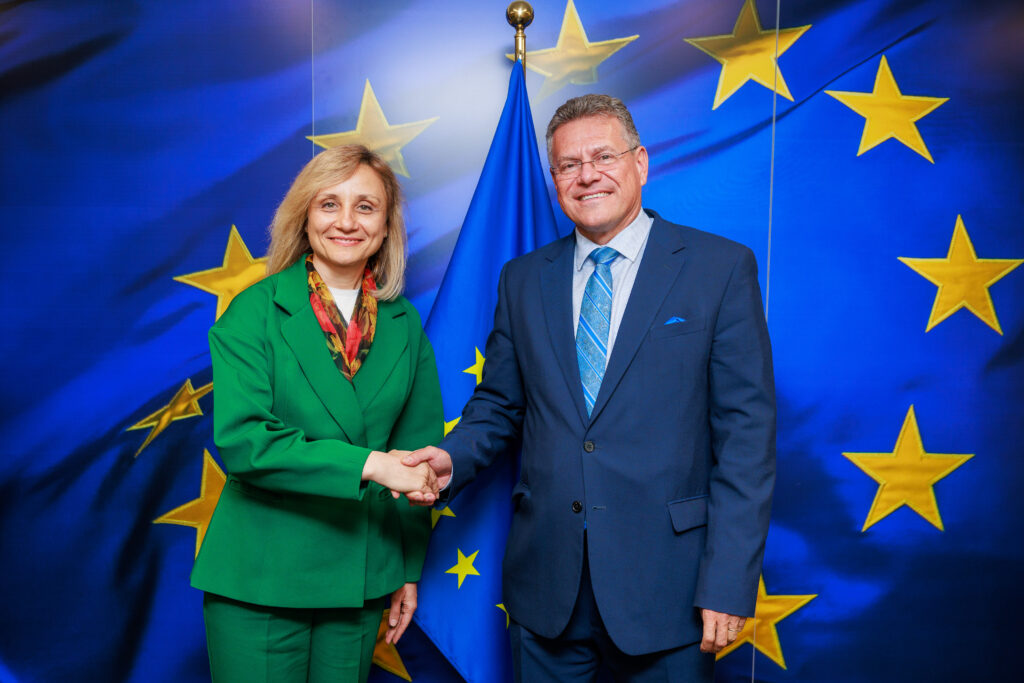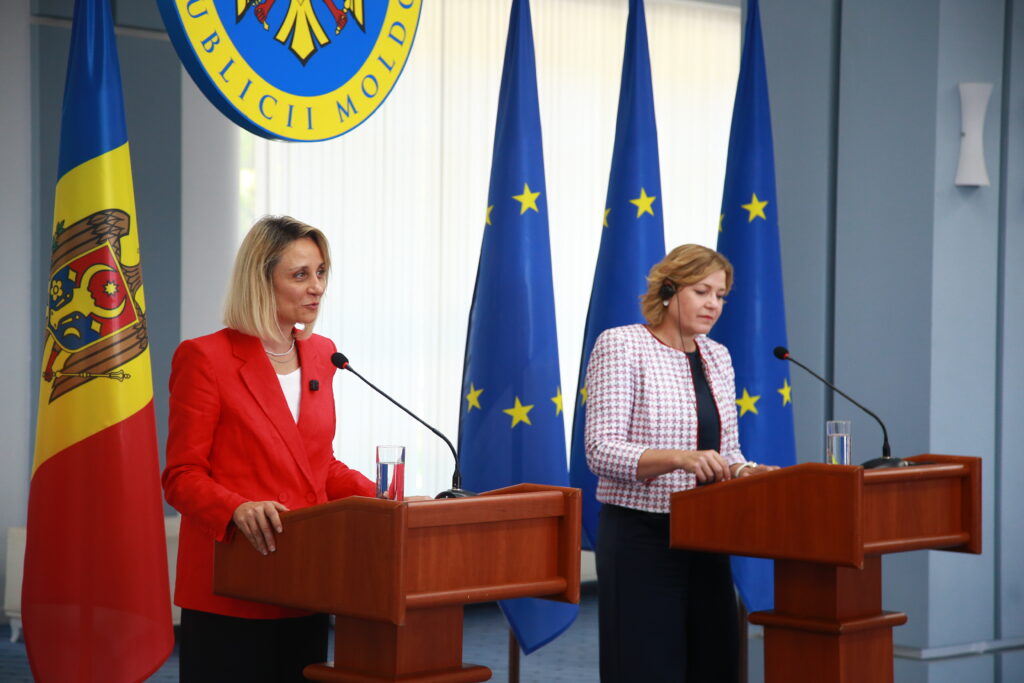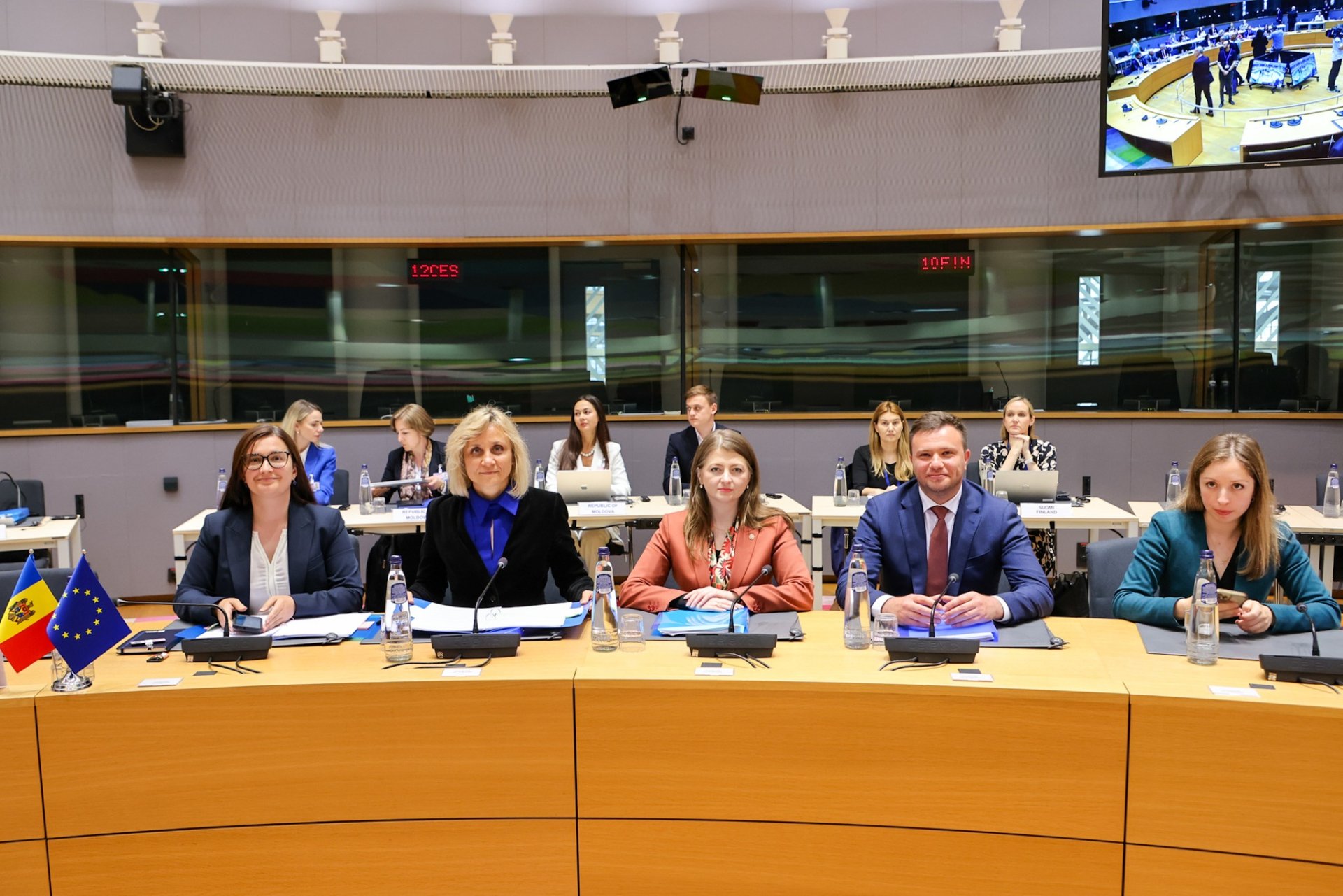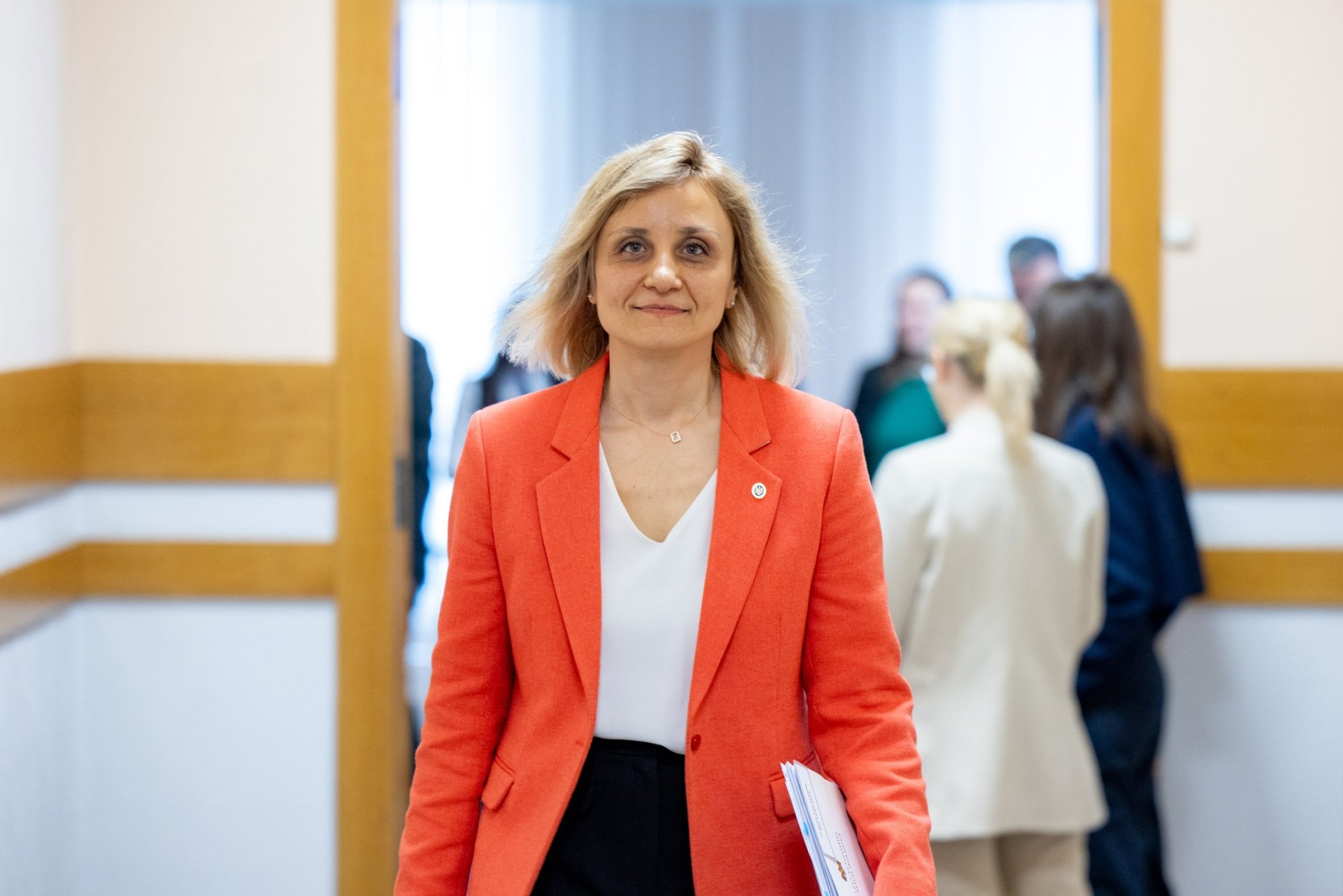
INTERVIEW MOLDPRES // Deputy Prime Minister: Our goal - transition from consumer economy to modern, competitive, export-oriented one, deeply connected to European market
Deputy Prime Minister, Minister of Economic Development and Digitalization Doina Nistor gave an exclusive interview to MOLDPRES State News Agency, and spoke about expanding access for Moldovan products on the European Union market, how prepared local producers are to leverage new export quotas, and the solutions proposed by authorities to support them. The official also referred to improving access conditions for certain agri-food products from the European Union, as well as the actions to be taken for protecting the internal market.
MOLDPRES: In recent years, Moldova's economy has undergone major changes, particularly in terms of exports, marked by a reorientation towards the European Union market, which has become the country's main trading partner and investor. What actions have driven this change, and how do you see the medium-term evolution of the trade balance between Moldova and the European Union?
Doina Nistor: Indeed, in recent years, Moldova has gone through a profound reorientation of trade flows, and the European Union has become our country's main economic partner.
If in 2013, 46.8% of exports went to the EU and 38% to CIS countries, today the ratio has radically changed: 67.3% of goods exports go to the EU, while only 6.8% go to CIS (of which 3.3% to the Russian Federation).
This change did not happen by chance. It was the result of several strategic steps:
1. Implementation of the Deep and Comprehensive Free Trade Agreement (DCFTA) – signed in 2014 and enforced in 2016, eliminating most customs tariffs, facilitating access for Moldovan products on the European market.
2. Additional trade liberalization for several Moldovan agricultural products for 3 years, approved in 2022 by the European Commission.
3. Diversification and modernization of our production through financing programs and grants. More and more Moldovan entrepreneurs have managed to invest in European standards of quality and food safety, allowing them access to the EU market.
Regarding the sectors with the most significant growth, we particularly discuss fruits. For example, in 2023, Moldova ranked first in plum exports to the European Union, a remarkable result that confirms the competitiveness of our products on the community market.
I am confident that exports to the EU will grow further in the coming period, especially as we have increased quotas for several fruits, offering our producers a real window of opportunity to expand and diversify in the European market.
MOLDPRES: In late July, the European Union announced that it is expanding access for Moldovan products on the community market, offering increased quotas for plums, apples, table grapes, and cherries, while exports of grape juice, tomatoes, and garlic are fully liberalized. Are domestic producers ready to harness these quotas?Doina Nistor: Data of 2021–2024 clearly shows that Moldova has consistently exceeded the preferential tariff quotas set in 2020 by the DCFTA Agreement, especially for plums and grapes, where exports to the EU have reached volumes two to three times higher than the limits back then. Additionally, in the case of cherries, even in years with difficult climatic conditions, deliveries exceeded the quota level available, confirming the interest of European importers and the responsiveness of Moldovan producers.
For example: for table grapes, we increased from 15,793 tons in 2021 to 33,415 tons in 2024, with a 112% increase, and the export value increased more than three times - from 12.3 million to 43.2 million dollars. All these despite a tariff quota of 20,000 tons. I remind you that from 2022 until this summer, our country benefited from complete liberalization for seven agricultural products: cherries, plums, apples, grapes, tomatoes, grape juice and garlic, allowing us to export to the EU exceeding the quotas provided in our agreement with the EU.
For apples, exports increased from 1,004 tons in 2021 to 24,887 tons in 2024, a spectacular leap of 2,378%, while the existing quota was 40,000 tons. For plums, in 2023 we exported 55,574 tons, 3.7 times more than the quota of 15,000 tons. Even for cherries, a product more sensitive to climatic conditions, exports in 2024 were of 2,066 tons, exceeding the previous quota of 1,500 tons. In 2023, we reached a peak of 2,667 tons, almost double the preferential quota limit.
This trend confirms that Moldovan exporters are ready to expand their presence on the EU market and that increasing preferential tariff quotas not only reflects current trade reality but is essential for maintaining the development pace and strengthening bilateral trade relations.
At the same time, the horticultural sector continues to expand and modernize. During 2021–2023, 186.5 million lei were invested in perennial plantations. Significant investments in new plantations, high-performance varieties, processing technologies. In 2024, new applications are in the process of authorization, supported by AIPA. Until 2027, it is planned:
- +450 ha of apple trees;
- +360 ha of cherry trees;
- +350 ha of plum trees.
In conclusion, this decision by the European Union supports a dynamic sector, which has demonstrated that it can consistently deliver large volumes, to European standards and represents another step in deepening trade relations between Moldova and the EU.

MOLDPRES: On the other hand, Moldova has agreed to improve access conditions for certain agri-food products from the European Union. Thus, starting from 2026, quotas on imports of frozen pork, poultry, and some dairy products, including butter, will be gradually increased. What measures will the authorities take to protect the internal market?
Doina Nistor: The opening of Moldova's market for animal-origin products from the EU will be done gradually and balanced, starting from 2026. For frozen pork, an initial quota of 500 tons is proposed in 2026, with annual increase of 150 tons until 2028 and an increase of 200 tons in 2029, reaching a total of 1,000 tons. The mechanism is similar for poultry meat.
In the dairy sector, the offer targets two tariff positions: milk and cream with a fat content of over 3%, with a combined quota of 1,000 tons, and butter, for which a progressive quota of 500 tons is proposed (starting with 200 tons in 2026 and annual increases of 100 tons).
This commitment reflects a realistic and sustainable approach to integration into the EU single market. At the same time, it addresses a concrete need of local meat and dairy processors, who periodically face shortages of raw materials, either due to African swine fever or a shortage of high-fat butter.
The quantities proposed by Moldova have been agreed upon with local producers. Additionally, the gradual liberalization offers them the necessary time to adapt, in the perspective of joining the European Union, expected in 2030.
It is a mutually beneficial measure: it offers predictability to Moldovan farmers and strengthens European producers' access to a market in the process of modernization.
At the same time, the decision to revise the DCFTA Agreement contains a safeguard clause, allowing the temporary suspension of trade preferences in case of massive imports that could affect the activity of local producers.
MOLDPRES: What are the main Moldovan products with the highest demand on the European Union market and in which sectors is there potential for growth? Are there specific European target markets that Moldova aims to more actively access?
Doina Nistor: We refer here to both agricultural and industrial products.
Among industrial products, we can mention:
- Vehicle wiring – representing the main export product, confirming Moldova's integration into European value chains in the automotive and electrical equipment sectors.
- Glass products and packaging, such as glass containers
- Clothing (coats, sweaters, trousers)
- Wines and alcoholic beverages
Among agricultural products:
- Corn, which is competitive in the animal feed and industrial processing segments.
- Wheat and mixed grains, with constant demand in Eastern Europe.
- Sunflower and rapeseed seeds, demand supported by the European vegetable oil and bio-products industry.
- Table grapes, a constant demand in Western European markets, especially Germany, the Netherlands and Scandinavia.
- Fresh plums, indicating considerable room for expansion, especially in Poland, Romania and France.
- Even concentrated apple juice, competitive through price and quality and requested by the beverage industry in the EU.
We also have some sectors with significant growth potential:
- Auto and electronics industry, including wiring, inductors, electrical components, due to geographic proximity and competitive costs.
- Agri-food and fruit processing, especially concentrated juices, vegetable oils, and organic products.
- Textile and apparel industry, focusing on finished products, local brand, and added value.
- Eco-friendly packaging and glass articles
- Fresh apples, a clear opportunity for expansion in Central and Western European markets.
- Cherries and other stone fruits, an increasing interest in high-quality seasonal products, demanded in premium markets in Austria and Germany.
It is also important to mention that European target markets for Moldova are:
- Germany, France, and Italy – for fresh fruits, wines and vegetable oils;
- The Netherlands and Belgium – for processed and industrial products (e.g., apple juice, protein cakes);
- Poland, Romania, and Austria – for seasonal fruits and cereals.
Additionally, there is a strategic interest in the Nordic markets (EFTA member countries), which appreciate organic products.
Moldova has a clear competitive advantage in the agri-food sector, both through product quality and geographic proximity to the EU. With logistical support, investments in post-harvest infrastructure, and commercial promotion, Moldova can more efficiently leverage its agricultural potential, strengthening its position as a supplier of safe, organic, and seasonal products on the European market.
MOLDPRES: What challenges do Moldovan producers face in exporting to the European Union, and what measures are the authorities taking to ease their access to the European market and enhance competitiveness?

Doina Nistor: Exporting to the European Union opens significant opportunities for Moldovan producers but also involves adapting to a set of standards. To expand access to the EU market, Moldovan producers need to meet the following key standards: the regulation on the marketing of plant protection products; the directive on the sustainable use of pesticides; the regulation on official controls for food safety, plant health, and animal welfare; and the directive on the protection of waters against pollution by nitrates from agricultural sources.
These standards entail investments in traceability, sorting, packaging, reducing pesticide residues, and modernizing logistics, aspects in which the Moldovan horticultural sector has already started to invest. The government supports entrepreneurs to make these investments through the Entrepreneurship Development Organisation programs, grants and credit guarantees.
MOLDPRES: To what extent will the EU decision to expand access for Moldovan products on the community market encourage companies from the Transnistrian region to export their products to the European market and enhance quality?
Doina Nistor: Data of 2022–2024 show an accelerated orientation of exports from the Transnistrian region towards the European Union. If in 2022, 63.9% of the total went to the community market, in 2024 this share reached 78.9%. At the same time, deliveries to CIS from the Transnistrian region significantly decreased, from 18.3% to 8.71%.
This reorientation is also visible in the plant-origin products, where exports to the EU rose from 38.5% in 2022 to 56.8% in 2024, while the share of exports to other countries fell considerably.
Moreover, in 2024, there is a slight decrease in the total export value compared to 2023, but the increase in export value to the EU (from 286.05 million US dollars to 303.98 million US dollars) suggests a strengthening of access to this market, compensating for declines in other directions.
Thus, expanding access to the EU market not only provides a stable and valuable channel for exports but acts as a strong incentive for alignment with European standards. For companies from the Transnistrian region, this favorable context encourages investments in process modernization, increasing competitiveness, and reducing dependency on more volatile markets, such as CIS.
It is worth mentioning that the primary European destinations for exports from the region are: Romania (42%), Poland (9%), Czech Republic (6%), Italy (6%), and Bulgaria (5%), markets with high and stable quality requirements. This reality acts as a constructive pressure factor, stimulating sustainable development and continuous improvement of local standards.

MOLDPRES: The Ministry of Economic Development and Digitalization delegation has been several times to Brussels in the context of bilateral screening. To what extent does Moldova's current legislation comply with European standards and in which areas are the most significant adjustments needed?
Doina Nistor: Moldova has made significant progress in aligning its legislation with the community acquis, but adjustments are still needed in certain sectors.
Priorities include business environment, competition, public procurement, product safety, technical standards, and digitalization reforms. The harmonization process progresses at a sustained pace, with the support of European partners and in constant consultation with the business environment.
So far, Moldova has transposed 42 relevant European legislative acts for free movement of goods, of which 17 are considered fully harmonized, and 25 partially harmonized.
In parallel, Moldova is preparing to initiate negotiations for signing the Agreement on Conformity Assessment and Acceptance of Industrial Products (ACAA), in priority sectors for the national economy, such as: low-voltage electrical products and electromagnetic compatibility. The agreement will allow product certification directly in the country, and conformity assessment results will be automatically recognized by the European Union.
MOLDPRES: How do you see the development of Moldova's economy in the coming years, and what should be the strategic priorities in the context of current regional and global challenges?
Doina Nistor: Moldova has already embarked on the path of building a new economic model, based on three essential pillars: investment, productivity and innovation. Our goal is a transition from a consumer economy to a modern, competitive, and export-oriented one, deeply connected to the European market and open to the world.
We are working in parallel on several fronts. First, we will continue to attract and direct public and private investments in infrastructure, industry, digitalization and energy. In this regard, the EU Growth Plan represents a historic opportunity to speed up the efforts.
The second pillar (productivity) involves modernizing local businesses and increasing their capacity to deliver more added value. This is achieved through digitalization, the use of advanced technologies, and the implementation of European standards. ODA programs are already better targeted, with financial support from the government and European partners, to support local entrepreneurs who generate value here, at home.
The third pillar (innovation) involves investing in human capital and preparing young people for the professions of the future. We are connecting education with the real economy and laying the foundations for innovation ecosystems, such as Moldova Hi-Tech Park, developed in collaboration with UTM and USMF, or Agrotek Park, the first university research park in smart agriculture and food tech, on the UTM campus in Mircești. In addition, we have promoted concrete policies: the Freelancers Law and My First Job Program, already adopted by Parliament.
At the same time, we are committed to building a more predictable and business-friendly environment. Simplification and debureaucratization, digitization of public services and intelligent transposition of European legislation are key priorities.
At the external level, our goal is deeper integration into the European market, as well as diversification through leveraging existing agreements, such as the one with EFTA, and by developing new trade partnerships. We will support Moldovan companies to invest in quality standards, sustainability, and ESG compliance, so that our products are competitive on international markets.
This is a clear, ambitious, and realistic vision. And we are building it day by day through reforms, concrete projects, and close collaborations with our European and international partners.
Thank you for the interview
Reporter: Natalia Sandu.
Rodica Iordanov: Investments in ecology recovering, bring visible benefits in Moldova
Interview MOLDPRES // Moldovan interior minister says ministry tries to have endowments at international standards for Interior Ministry's employees, with support of government, strategic partners
Defense Minister: Given current threats, air defense continues to hold special place in priorities for strengthening defense capabilities
MOLDPRES INTERVIEW // Moldovan deputy PM, economic development, digitalization minister says progress made in 2024 year, despite all challenges
MOLDPRES INTERVIEW/ Moldovan health minister says increase in salaries of medical system employees priority of Health Ministry
INTERVIEW // Moldova's Ambassador to Israel Alexandr Roitman speaks about challenges faced by Moldovans, exports, interpersonal relations
INTERVIEW MOLDPRES/ Environment Minister
Moldovan deputy PM says European integration not sprint, but marathon
Interview with Customs Service director: Our vision based on integration with international standards, maximum efficiency and strong climate of integrity
MOLDPRES INTERVIEW/ Agriculture and Food Industry Minister says Moldova experiences times with many opportunities
ADR North director: With EU support, North Region and whole country to transform even more in coming years
INTERVIEW // Romanian Ambassador to Moldova says his country wants Moldovan citizens to have prosperous future in European Union
EU High Level Adviser on Environment says Moldova in European Green Deal provides for overcoming challenges, turning to account opportunities, capacity of local actors
Romania's experience in EU integration process. Romanian consultant for European funds says mayors should unite to carry out joint projects
Moldovan foreign affairs minister has meeting with Secretary General of Council of Europe
Hospitalizations, 18 surgeries for severe injuries made at Moldova's Emergency Medicine Institute in last 24 hours
Parliament speaker says Moldova condemns attacks against civilians in Ukraine, which cannot be justified in any way
Deputy Prime Minister meets new PACE President: We reaffirmed firm commitment to continue close cooperation
Meteorologists extend yellow fog alert in Moldova
Ferry service at Molovata not to resume in coming weeks
Minister of Agriculture about impact of frost on orchards nationwide: We are monitoring situation
Coordinated actions to reconnect consumers to electricity
Energocom to submit request to adjust gas tariffs this week, Minister of Energy says
Number of soldiers in National Army to increase to 8,500
Government extends entitlement to social benefits for independent entrepreneurs
Authorities coordinate actions to eliminate consequences of bad weather
Moldova extends temporary protection for displaced persons from Ukraine until 1 March
Moldovan President about Russian attack on train in Ukraine: Those responsible must be held accountable
PHOTO // National Army soldiers' intervention in Strășeni district
Independent entrepreneurs to be eligible for social benefits


